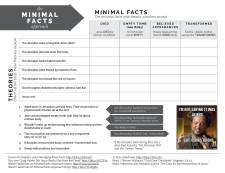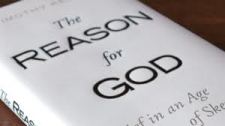This thread updates the old “determinism and free will” thread.
Predestination and Free Will
I start off asking a question for the purpose of introducing concepts in its answer: freedom and determinism: compatible or incompatible? Ultimately, though, the question is: predestination and free will… either/or… or both/and? It will be shown that determinism and predestination are different concepts – this is a key difference between this thread and the old thread.
Freedom and determinism: compatible or incompatible?
Defining freedom:
Incompatibilist freedom: “there are no conditions prior to an action that determine that action,” (p. 195, Intro. to Philo.).
Compatibilist freedom: “there can be conditions prior to an action sufficient to determine that action, and yet that action can be free,” (p. 195, ibid.).
Defining determinism:
Determinism: “theories about universal causation and total predictability … the belief that all events are governed by laws,” (pp. 194-195, ibid.). “By ‘determinists’ here we mean those who deny that in moral decisions we are free to do other than we do. A determinist, as opposed to a self-determinist, believes that all moral acts are not caused by ourselves but are caused by someone (or something) else,” (p. 31, Chosen But Free; CBF).
Different views:
The Two-Level Theory (reasons are not causes) “maintains that beliefs in determinism and free will are in some sense independent. … Reasons are essentially different from causes,” (204, Intro. to Philo.). I’m not really interested in going into this.
Hard Determinism (no free will) “applies to what we may call the physiological states and changes in our body such as height, weight, growth, pulse rate, and so forth, as well as to our purposive deliberative behavior. …If the hard determinist account of action is true, it is difficult to see how anyone can be responsible for his actions. The only basis of either praise or blame is to be found in its consequences. … One imagines that he deliberates, but that is exactly what it is, an imagination. … The hard determinist denies that any alternative action is causally possible. Every action is necessary,” (198, Intro. to Philo.).
Theological determinism – “the view that God ordains every event and situation; man does not have the capacity to choose or influence his own ultimate destiny,” (205, ibid).
Soft Determinism (compatibilist) claims “(1) determinism is true, and therefore events including human behavior, voluntary or otherwise, arise from antecedent conditions, making alternative kinds of behavior impossible; (2) voluntary behavior, however, is free to the degree that it is not performed under external compulsion; and (3) in the absence of external constraint the causes of voluntary actions may be traced to certain states, events, or conditions within the agent, namely his will or volitions, choices, decisions and/or desires,” (199, ibid). “Soft determinists assert that all that is necessary (to consider the will ‘free’) is that we have reasons, we decide, and we carry out decisions without external compulsion,” (201, ibid) (they deny contra-causal power).
Jonathan Edwards’ divine determinism — “Jonathan Edwards ‘solved’ the problem of predestination and free will by claiming that (1) free will is doing what we desire; (2) but God gives us the desire to do good,” (23, CBF). This does not solve the problem because it does not account for evil desires, which God cannot give.
R.C. Sproul — “In spite of the fact that his mentor, Jonathan Edwards, rejects the view of human freedom called self-determination, R.C. Sproul speaks of free will as ‘self-determination’ … but Sproul simply means it is not determined (caused) by anything external to itself. It is determined by things internal to itself, namely, by its nature. This is not what is meant in this discussion by a ‘self-determined action,’ which is one freely caused by the self (the I) without either external or internal constraint,” (21, CBF).
Simple Indeterminism (no determinism) contends that uncaused events are our free acts, not governed by any law, scientific or otherwise. “Some defenders … invoke Heisenberg’s principle of uncertainty … the basis for the quantum theory in physics,” (201-201, Intro. to Philo.). However, “if we should conceive of a decision as utterly without any cause (this would in all strictness be the indeterministic presupposition) then the act would be entirely a matter of chance, for chance is identical with the absence of a cause; there is no other opposite of causality,” (393, Schlick*).
Libertarianism (self-determinism) asserts “that our free actions are neither caused by another (as in determinism) nor are they uncaused (as in indeterminism). Rather, they are self-caused. Hence, the view is sometimes called self-determinism because of the theory of personal agency. / A human being (person or self… even Hume presupposes the real existence of an ‘I’ or entity behind his impressions which gives unity to them) is sometimes, although admittedly not always, a self-determining being. We are, in other words, sometimes the cause of our own behavior (not causing our self, but causing our behavior). The libertarian holds that for an action to be free it must be caused by the agent who performs it, and it must be done in such a way that no antecedent conditions are sufficient for the performance of that act. If an action is both free and rational, the action must be done for a reason, although the reason is not the action’s cause. This means that we could always have done otherwise. At least two possibilities were live options. / This account of freedom is the only one which does justice to the deeply-ingrained intuition that we do have contra-causal power. Second, this view alone makes any sense of the activity of deliberation. All the positions examined to this point, so it is argued, really do not properly account for human deliberation,” (202-203, Intro. to Philo.).
***
Predestination and free will… either/or… or both/and?
Geisler & Feinberg’s discussion on libertarianism (self-determinism) in “Intro. to Philo.” does not address the reality that “…our free actions are determined from the standpoint of God’s foreknowledge,” (45) as Geisler does in “Chosen But Free”. Chosen But Free compares extreme Calvinism, which sacrifices free will to save predestination, extreme Arminianism, which sacrifices predestination to save free will, and the preferred moderate Calvinism, which shows free will is compatible with predestination. In “Intro. to Philo” it is said that “libertarianism holds that determinism and freedom are incompatible,” (202). This is because there is a difference between the concept of determinism mentioned above, and the way the universe is actually determined (predestination).
Defining predestination compatible with free will:
“Whatever God foreknows must come to pass (i.e., is predetermined). … By ‘determined’ here we do not mean that the act is directly caused by God. It was caused by human free choice (which is a self-determined act). By ‘determined’ it is meant that the inevitability of the event was fixed in advance since God knew infallibly that it would come to pass. Of course, God predetermined that it would be a self-determined action. God was only the remote and primary remote cause. Human freedom was the immediate and secondary cause,” (44, CBF). Predestination “implies that God has actually determined (rather than simply saw) in advance the destiny of creatures,” (wikipedia). Consider that “God not only created all things, He also upholds all things. Hebrews declares that God is ‘sustaining all things by His powerful word’ (Heb. 1:3). Paul adds, ‘He is before all things, and in Him all things hold together’ (Col. 1:17). John informs us that God not only brought all things into existence but He keeps them in existence. Both are true for ‘they were created and have their being’ from God (Rev. 4:11). There is ‘one Lord, Jesus Christ, through whom all things came and through whom we live’ (1 Cor. 8:6; cf. Rom. 11:36). Hebrews asserts ‘it was fitting that God, for whom and through whom everything exists, should make the author of their salvation perfect through suffering’ (Heb. 2:10),” (12, CBF).
“First, it is possible that God knows from eternity that an event that is future to us would one day occur (and then be true). In this case, it would not be true in advance before it occurred, but it would be true that God knew in advance that it would one day occur and then be actually true.
“Second, … God … is eternal, that is, beyond time … Hence, nothing is future to God. If God is beyond time, then all time is spread before Him in one eternal now. He sees the way a man on the top of the hill sees the whole train at once, while the man in the tunnel below sees only one car going by at a time, noticing neither the one already past nor the one yet to come. God is not standing on one day of the calendar of time, looking back at the days past and forward to the days to come. Rather, He is looking down on the whole calendar, seeing all the days at once (cf. 2 Tim. 1:9; Titus 1:2),” (110-111, CBF).
Questions in Wikipedia’s predestination article answered:
1. “Is God’s predetermining decision based solely on a knowledge of His own will, or does it also include a knowledge of whatever will happen?” (wiki)
Both. God’s predetermination is in accord (1 Peter 1:2) with His foreknowledge. If based solely on His will, this is ‘voluntarism’ which “affirms something is right simply because God willed it, rather than God willing it because it is right in accordance with His own unchangeable nature (a view called essentialism). If voluntarism is accurate, then there is no moral problem with irresistible grace on the unwilling, limited atonement, or even double-predestination. If, on the other hand, God’s will is not ultimately arbitrary, then extreme Calvinism collapses,” (244). The alternative to voluntarism is essentialism, which “contends that God wills it because it is right. … There are two basic forms of essentialism: either God is bound to will things in accordance to some standard outside Himself (as in Plato’s Good) or else by the standard inside Himself (namely, His own nature). The latter is held by Christian essentialists,” (247, CBF). On the other hand — “if God’s choice to save was based on those who choose Him (‘whatever will happen,’ wiki), then it would not be based on divine grace but would be based on human decisions,” (51, CBF) (Romans 9:16). He does not base His choice on who He foresees will receive His gift (Arminianism) – but He knows in advance who will receive His salvation (persuasive, but not coercive) because He is beyond time. For more on this, go here:
http://jesuschristsonofgodsavior.blogspot.com/2008/01/god-wills-it-right-because-he-is-good.html
2. “How particular is God’s prior decision: is it concerned with particular persons and events, or is it limited to broad categories of people and things?” (wiki)
Both. He is intimately familiar with every detail. However, His sovereignty does not prevent free choice. Even if you have the power to force your child to behave a certain way, you can still step back and allow your child to make her own decision. The same is true in the case of God’s power and our decisions.
3. “How free is God in effecting His part in the eventual outcome? Is God bound or limited by conditions external to His own will, willingly or not, in order that what has been determined will come to pass?” (wiki)
God is free because this is all determined from beyond time (from His perspective, there is no “in order that (it) will come to pass” – it has already happened). God is bound to will according to His own nature. This sounds like determinism (above) but it isn’t, because He incorporates our free choices from beyond time. We, made in God’s image, are co-creator creations.
“Furthermore, the same sort of considerations apply to the freedom of man’s will.
1. “Assuming that an individual had no choice in who, when and where to come into being: How are the choices of existence determined by what he is?” (wiki)
“Don’t my background, training, and environment affect what I do? Yes, they do, but they do not force me to do it. They affect my actions, but they do not effect (i.e., cause) them. They influence but do not control my actions,” (26, 27, CBF). This includes predisposed or biological inclinations or character traits. I think this is important because I used to be the sort of determinist who would say that knowledge does not increase freedom as far as free will is concerned – everything we come to know determines how we will think, feel, behave, etcetera, differently, from that point on. I no longer deny free will, and the most essential person we can ever come to know who will lead us to increased freedom, on so many levels, is Jesus.
2. “Assuming that not all possible choices are available to him: How capable is the individual to desire all choices available, in order to choose from among them?” (wiki)
Only God is omniscient of all possible choices, and therefore only God is omnipotent (completely free). But one does not need complete freedom in order to exercise freedom; one need only two options, not all options, in order to make a choice. Granted, only one choice will be made, and from God’s perspective, the alternatives were never actual. Also, the closer our walk with God, the freer our will.
3. “How capable is an individual to put into effect what he desires?” (wiki)
This (like the previous questions) has nothing to do with whether or not he has free will, but it does point out there is a continuum of freedom. Not being able to perform what you ‘will’ (or ‘will’ all possible choices) does not negate the fact that you are freely willing. I disagree with a few philosophers that it isn’t “willed” unless it is “acted out”. That there is an obstacle does not negate the fact that if it were removed, I could then perform the action according to my free will that was free before and regardless of the performance of the action.
“Chosen But Free” (Geisler) goes into verses of the Bible to show how extreme Calvinists, extreme Arminians and moderate Calvinists interpret them. If you are curious about a particular passage, just ask. The book also goes into TULIP – the five points of Calvinism, and compares extreme and moderate Calvinism according to those five points. I can go into them if you like. I highly recommend you purchase the book, as well as “Introduction to Philosophy: A Christian Perspective” by Geisler and Feinberg.
*Moritz Schlick, “Freedom and Responsibility.” [reprinted in The Philosophical Quest: A Cross-Cultural Reader, McGraw Hill, 2000]. It is interesting to note that all the articles on this issue in the reader were of the soft-determinist “goin’ with the flow” variety – basically, I’m free if I like whatever thought/feeling/action I’m involved in (though I’m not causing it… I’m just riding the kind waves of determinism). They pretty much deny the reality of personal responsibility, deny the crashing waves are caused by our own splashing around…
I also said in the old thread that I wanted to answer the problem of evil, as it pertains to God’s eternal omniscience and omnipotence.
This quote is taken from pages 329-330 of Introduction to Philosophy: A Christian Perspective (Geisler, Feinberg) —
b. the second argument for dualism
The second argument for dualism is more of an argument against non-dualism (especially theism). The dualist says that the theist cannot escape the following conclusion:
(1) God is the author of everything that exists.
(2) Evil is something that exists.
(3) Therefore, God is the author of evil.Since theists affirm God’s sovereignty and creative power over all that exists, they cannot deny premise 1. Likewise, since theists do not, like pantheists, deny the reality of evil, they cannot deny premise 2. But this means theists seem stuck with an unwanted conclusion, since it makes God directly responsible for creating evil.
Theists respond to both premises. First, God is the author of some things only indirectly. For example, God created freedom, but He does not perform acts of evil Himself or through man’s free choice. To state it another way, God does not create evil directly or essentially but only incidentally. God is directly responsible only for the fact of freedom, not for all the acts of freedom. Of course, God did create the possibility of evil when He made men free. But it is free creatures who bring about the actuality of evil. God is indirectly responsible for evil in that He made evil possible. But the possibility of evil is actually a good—it is necessary for human freedom. The power of free choice is a good power; the fact that men abuse freedom does not make freedom bad. Men abuse everything, including the water and air in their environment. But this obviously does not mean that water and air are bad.
Many theists also object to the second premise. Evil is not a “thing” (or substance). Evil is a privation, or absence of good. Evil exists in another entity (as rust exists in a car or rot exists in a tree), but does not exist in itself. Nothing can be totally evil (in a metaphysical sense). One cannot have a totally rusted car or a totally moth-eaten garment. For if it were completely destroyed, then it would not exist at all. The Christian points to Scripture which says everything God made was “good” (Gen. 1:31); even today “every creature of God is good” (1 Tim. 4:11), and “nothing is unclean in itself” (Rom. 14:14). To be sure, the Bible teaches that men are totally depraved in a moral sense, since sin has extended to the whole man, including his mind and will (Rom. 3; Eph. 2). But total depravity is to be taken in an extensive sense (affecting the whole man), not in an intensive sense (destroying the very essence of man).
When the theist says that evil is no “thing” (substance) he is not saying evil is “nothing” (that is, unreal). Evil is a real privation. Blindness is real—it is the real privation of sight. Likewise it is real to be maimed—it is a genuine lack of limb or sense organ.
Evil is not mere absence, however. Arms and eyes are absent in stones, but we would not say that stones are deprived of arms and eyes. A privation is more than an absence; it is an absence of some form or perfection that should be there (by its very nature).
Relevant article: Does free will conflict with sovereignty?










If the world were determined rather than predestined, this would make sense…. On the one hand, He saved me from never knowing Him. On the other hand, from His perspective, He always knew that I would come to know Him, so “never knowing Him” was never going to happen, so it appears He didn’t save me from anything that was really going to happen. But – it would have happened if I had rejected His offer (a very hypothetical “if”). That option was always there – for me to follow after delusional alternatives (new age bull-oney, or old reliable atheism)… but I said yes to Him instead (how could I have said no?!).
Even though our options are ‘given’ rather than chosen — we can shape which options will occur to us (as conceivable) — (and to that extent they are chosen)…Knowing that you will only think about what you are exposed to and how you react to it, and that habits form by repeating attitudes/behaviors, you can willfully control what you are exposed to and/or how you react to it. You can therefore condition future reactions.Align your will with the will of God, so that by habit you will perform God’s will even when there is no time for thought. If you make an effort to behave against inclination, that inclination is not your will. That you want to make and do make an effort against it describes who you want to be (and therefore already are). Your inclination is an obstacle to who you want to be, like a broken leg is an obstacle to where you want to go. That inclination is just like a broken leg and does not describe your will. Who you struggle to be, and where you struggle to go describe your will. It’s like when you quit smoking cold-turkey, but still experience the pangs for nicotine — your body/brain wants it (but it is not your will) — it is not you who wants it. It is also like when you decide you are going to change your eating and exercising habits to permanently get rid of accumulated flab — that flabby body does not reflect the current state of your will. That flab is like the light of stars (hehe) — it is like looking into the past.
In reply to someone who says that it is immoral to go against natural selection, and moral to allow natural selection to take its course…<>Free Will as Supernatural Selection<>Something you may not realize is that you are calling human free will “supernatural selection”. Would you disagree with that? I would not disagree — as long as one realizes it (as well as supernatural miracles) is not “anti-natural”. Supernatural and natural are both part of reality as a whole. But when you realize this, you realize that for us to execute every repeat offender — is not “natural selection” — it is the same “supernatural selection” we do when we help them (anti-recidivism programs). Our very perceptual presence makes it impossible for “natural selection” (if it has anything to do with anything) to run its course as if we weren’t there… because we are responsible for whatever action or non-action is taken.
Not everything that exists, thinks… but everything that thinks, exists. Thoughts are things that exist, which don’t think (that’s what’s goin’ on when you’re dreaming… thoughts which don’t think) (until you become progressively more lucid, and start thinking your thoughts again). I think my thoughts, but I don’t “exist” as my thoughts. My thoughts are as much “me” as are my arms and legs. I can refuse to think the thought “I want to eat that entire bag of chips” – or I can choose to dwell upon it. Nip the chips thought in the bud, and I will be less likely to eat that bag of chips. If it hangs around, it is merely a phantom itch. Dwell upon that thought, and I will be more likely to eat that bag of chips. The thinking, the dwelling, is not itself the thought. I am the thinking, the dwelling. The thought is not me. What I choose to think and dwell upon will condition what thoughts are more likely to occur to me in the future – but I will still have the choice to refuse or dwell upon those thoughts. The “I” remains even after our thoughts become jumbled, memories lost – because we are still thinking, we are still dwelling, and we still have the power to refuse a thought. Refusing thoughts is half the battle. The other half is seeking thoughts that are edifying to replace the thoughts you now refuse. Supernature abhors a vacuum, too. I seek the Word. Here’s how to refuse a thought. Make the sound of a car screeching to a stop. Now make that sound in your head, without actually making any sound outside your head. Make that sound when you’re thinking a thought you don’t want to think, look somewhere else (not sure why/how that works), and replace it with a thought which edifies. Have a list of edifying thoughts memorized, and this’ll be much easier.
The past is all our accumulated memories. These memories act in the present & create our hopes & fears of the future. These hopes & fears are the psychological future; without them there is no future.So the present is the action of the past, & the mind is this movement of the past. The past acting in the present creates what we call the future.The response of the past is involuntary, it is not summoned or invited, and it is upon us before we know it.QUESTION: How are we gonging to be free from the past? (Jiddu Krishnamurti).I, MICKY, AM A GIFT TO ALL PEOPLE.
Hi, Micky, gift to all people. What does it mean to you… to be a gift to all people?Our present memories (conditioning) are not the past, they are part of the present. We can choose to give in to or overcome our conditioning. The closer our relationship with Christ, the more power we have over our conditioning. And even when we find we have acted poorly without thinking, we can rest peacefully in the love of Christ, who paid the price for all of our shortcomings.<><
One could argue — A) If we have free will, then we don’t need God, because we are free already, and B) If we don’t have free will, then we don’t need God to save us, because we’re not responsible for our sin. However — God wants us to love Him willfully, so He gives us ways to exercise and experience the limits of our will. Hence, faith. We are responsible as far as we are aware (that’s the ‘exercise our will’ part) — and, we need God because the purpose of our will is ultimately a love we will never realize apart from God (that’s the ‘experience the limits of our will’ part, as is anything else that teaches us we are not omni-anything, not God, the greatest of these being omnibenevolence). God has shown us a love regardless of circumstances, and it takes faith (confidence in that love) to live/love regardless of circumstances, motivated by and toward that love (which, in action, looks pretty crazy when contrasted with the way the world lives/loves).
I think “that everything is known, start to finish” does not mean we had/have/will have no part in it, because it is known by Someone who transcends time. Given (evidence) that God (transcending time) exists (He Himself doing a fine job of communicating His existence in His timing, with or without enlisting the aid of humans), then the fact that the past still exists and the future already exists does not just imply predetermination, but something beyond “pre”. (And yes, transcending time is transcending space as well, if you accept that time and space are tied together. I’m going to have fun going into that over the summer, and I’ll share it in the Fall, Lord-willing.) That it is something beyond “pre” is why it does not negate free will, responsibility, etc.. Free will is not an all-or-nothing thing, however. Some have freer wills than others. The freest are those who walk the closest with God.